
York Boeder CEO


York Boeder CEO
As a manufacturer of printing inks and paints (Creative Colours) for artists, how do we practice environmental protection on a day-to-day basis? What obstacles do we have to overcome, business with global operations?
At Marabu, we have been tackling these questions for a long time. As an ink manufacturer, to the environment and health and safety, both within our company and at our customers’ organisations. We have long gone beyond what is mandated by legislation and regulations –this is integral to our company philosophy and embedded within our daily business activities. As a vendor of premium products, we are committed to the further development and reformulation of top-quality inks while conserving resources to the greatest degree possible, across all our business segments.
We regard ourselves as pioneers: by proactively addressing environmental protection, occupational health and safety, resource conservation and sustainability, we have secured a special niche position within the competitive international marketplace. Over recent decades, the Marabu Group has made great progress in terms of environmental management. Key achievements have included systematic waste and recycling management, the installation of a state-of-the-art waste water treatment plant, and the use of “green” electricity. More recently, we have seen our attention turning to new, exciting areas, such as carefully targeted energy
By using environmentally friendly materials, energy-saving programs and resource-conserving production methods, we are reducing our impact on the environment and constantly reducing our carbon footprint. As part of our ambitious climate strategy, we have committed to reducing our emissions by a further 20% over the next 10 years. We are certain to embrace further fresh ideas in the future, prompted by our own conscience
our proactive approach conserves natural resources and contributes to safeguarding our environment.
Yours sincerely,
York Boeder CEO
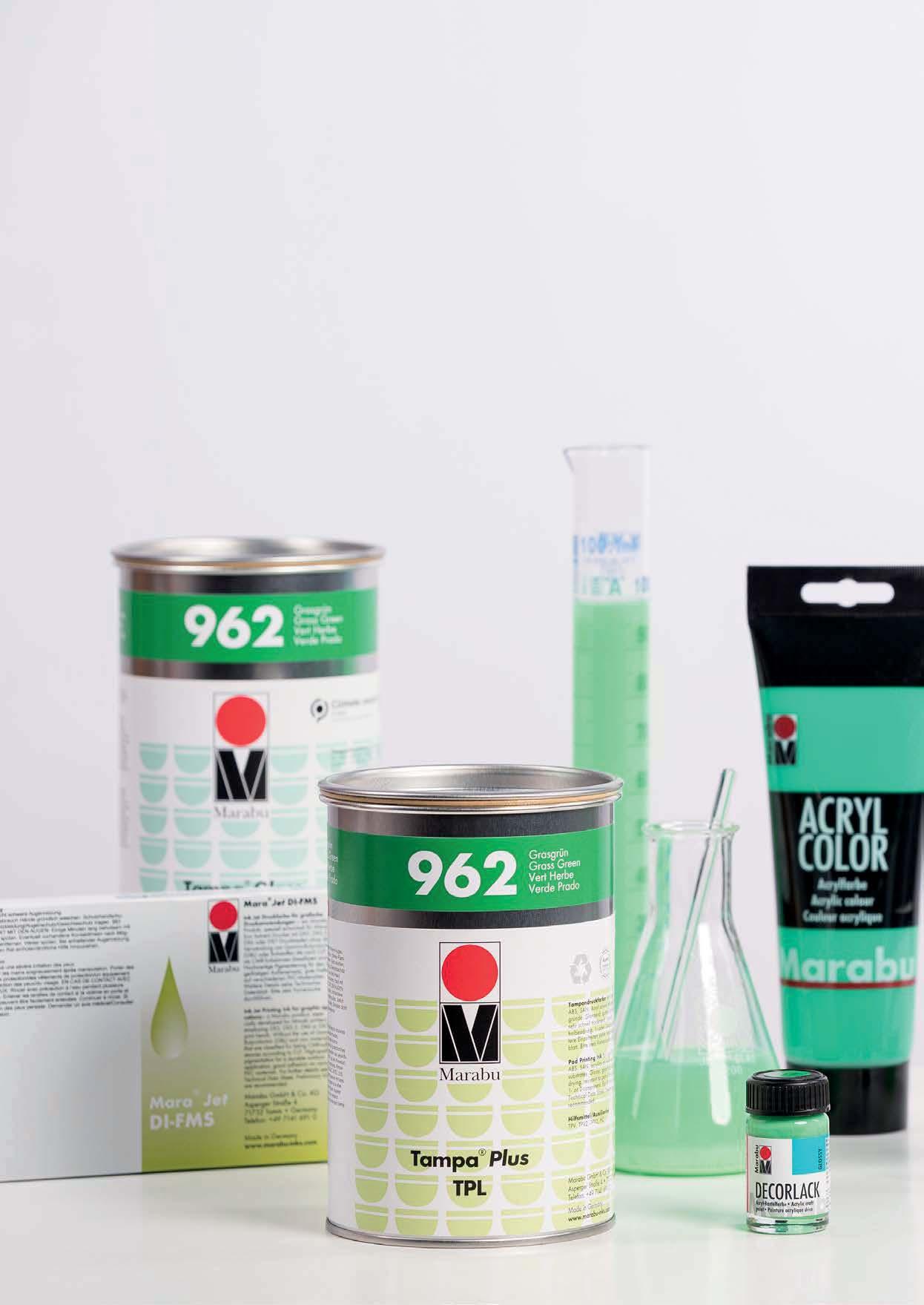
Screen Printing Inks
Pad Printing Inks
Digital Printing Inks
Liquid Coatings
Creative Colours

Our long-term, sustainable approach to business and our global competitiveness ensure the success of our multinational company.
Marabu offers premium-quality, user-friendly products across all business units. We are a leader in both inks for specialist printing processes and paints for crafts and hobbies. With 526 employees worldwide and a range of more than 20,000 products, we generate annual sales of over €130 million. Since April 2021, the Marabu Group has been a wholly owned subsidiary of Teikoku Printing revenues of approximately 100 million euros, primarily with screen-printing inks.
As an ink manufacturer, our decision-makers addressed ecological issues at a very early stage. A look at our company’s history reveals, for instance, that we had to comply with regulations imposed by government agencies as early as 1888.
Our green milestones:
business in Stuttgart in 1859, with a portfolio of in these products, he was interested in their in-house
Junior assumed responsibility for the business and, on the eve of the 20th century, introduced new items, including watercolours and pastels for artists. The construction of a new building brought in new regulatory requirements regarding waste water – which had to be directed to a special mud collector and not simply discharged onto an unpaved city pathway.
site in Tamm, allowing further growth. Here, the enterprise made a casein emulsion paint, known as Tamma, and oil paints. Again, strict regulatory requirements were imposed to protect water resources, and energy supply issues needed to be addressed. At the time, the company had was generated by a portable engine fuelled






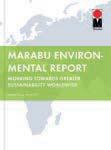
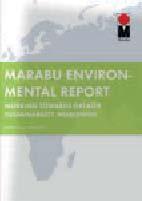


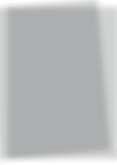



Knowing your origins is the foundation –knowing your destination is the spur!
drawing implements, which created a high volume head of the company and the third generation of the founding family, converted electricity generation to wood gas. This remained the source behind the power supply until 1953.
1952 marked the beginning of the era of screen-
dous solvents, without compromising product attributes. 1985 saw the launch of the non-with the EPEA, an international research and biodegradable ink for glass substrates, designed company unveiled Maqua® Jet, a water-based ink for digital printing methods, and pad printing ink Tampa® Tex to the OEKO-Tex® Standard 100 in 2013).
We are also committed to safeguarding the health and safety of users of our paints and inks for professional and amateur artists. 80% of our Creative Colours are water-based, and for children we offer
The product offering has been expanded over the years, and there has been an increase in the volume of manufacturing and storage needs, leading to growing demand for space.
Despite new buildings and extensions in Tamm, the site reached its limits. To resolve the issue, Marabu constructed a state-of-the-art building in BietigheimBissingen, three kilometres away, in 2004. Today, it houses our Creative Colours operations.
Our long-established efforts to improve environmental protection and safeguard employee health and Award from the European chemicals industry.
14001 production facility in Bietigheim-Bissingen



Thermographic survey in Tamm Bietigheim-Bissingen
9001
14001 upgrade of Tamm ISO 9001, ISO 14001 ISO 9001, ISO 14001
(5 Dec)


Step-by-step implementation of energy monitoring system in Tamm



Commitment to the climate alliance
2 by additional 20% over the next 10 years


aware of the changes taking place in our global environment. Catastrophic forest
that only a transformation in all relevant areas of our western lifestyles and changes to the way we do business can contribute to safeguarding our natural world.
165 years of company history, Marabu has addressed ecological issues from the very outset. Our unwavering commitment to all aspects of corporate environmental
protection, and the development and manufacture of low-emission products, are a solid basis for tackling the challenges that lie ahead.
However, the challenges today are greater than ever before. We must and will convert to a form of business that is fundamentally sustainable in a relatively short space of time. The focus is on reducing greenhouse gases and promoting a circular economy. Marabu is facing up to these tasks, and tackling them in all relevant areas of its business.
-
tions and our customers’ requirements, but also with legislation and the worldwide sustainable development sustainability strategy comprising 17 sustainable development goals (SDGs). These are directed at governments, but businesses, too, are expected to contribute to their only a subset. As a member of the (The German general meeting in May 2020.
VDL development – our compass

Marabu undertook a commitment in 2003 to no longer use input materials that are carcinogenic, mutagenic
we will be making greater use of water-based systems that packaging. For our Creative Colours, we are developing a product with a large proportion of natural raw materials.
High-quality education
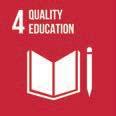
To guarantee inclusive, equal education opportunities across all disciplines, and to enable ongoing skills development in the paint and printing ink industry”
The recruitment and retention of skilled workers and new, young employees is a key issue for Marabu. Marabu offers young people training in many areas, and maintains close relations with universities and vocational colleges.
Our employees evolve their skills by attending taskplan. Additionally, for production workers we created the Marabu Academy, with weekly 30–45-minute training modules. Our internal Marabu Academy organises further training measures and online training courses, which also cover topics relating to occupational and legal safety in the environmental sector.

The future belongs to businesses that offer sustainable By developing sustainable products and implementing are safeguarding our competitiveness and strengthening Germany’s position as an industrial base.
Our products are of high quality, and provide coatings quality inks protects materials against premature wear.
Responsible consumption

printing inks and Creative Colours has long been a keying ink from its development to its disposal, environmental impacts can be observed at various stages. We assess them in their entirety through lifecycle analysis. When comparing and evaluating types of ink it is important to take a holistic view that considers all factors. Only then can you draw conclusions.
The term “water-based”, for instance, implies a high degree of eco-friendliness; at the same time, “vegetableoil-based systems”, on account of their high proportion of renewable raw materials, could be seen in an even more positive light. However, these products require
in full then some products emerge as less eco-friendly
The substrate, too, can have an ecological impact: drying a water-based ink on plastic or metal requires markedly more energy than is the case with materials such as corrugated card.
Considered critically, there is no single print technology or method that is a universally eco-friendly solution. The best solution can only be found when all relevant
into account during any analysis and subsequent evaluation (cf. wirsindfarbe.de 2022).
By looking at the entire picture, we work with our customers to apply the best possible ink system with the smallest possible ecological footprint.
Climate protection measures
To take steps to combat climate change the paint and printing ink industry”

As Marabu has been sourcing electricity from renewable energy sources since 2007, we do not cause any Scope 2 emissions. The challenge for the coming years is to emissions. To this end, we have drawn up a road map setting out measures for the next 10 years.
circular economy. Further goals include preventing any further loss in biodiversity and ceasing pollution.
As a maker of printing inks, we will be especially affected by this action plan. Many individual measures have increase the price of fossil fuels, promote a clean, circular economy, combat pollution and much more.
Our Product Safety department is the prime mover of the corresponding discussions and is actively involved in European industrial associations, working towards a Europe that is free from pollution,
we can play our part, then we do so gladly and with complete conviction.
Our overriding goal is to protect the natural world against harmful impacts on air, water and soil. We believe humanity’s most urgent task is to address climate change and its effects. Our “ contributes to reducing atmospheric greenhouse gases. Wherever possible, we make all efforts to support the Development Goals.
Safeguarding human life and the environment is integral to all relevant business processes. We oblige all our employees to comply fully with all relevant duties and policies.
2. Products
We develop state-of-the-art products with low emissions across their entire lifecycle. We prioritise water-based systems and the use of renewable materials.
3.
We choose all our raw materials with the greatest care. Where technically feasible, we avoid the safety precautions. Wherever possible, we employ less harmful substitutes that pose much lower health risks.
4.
serve primary natural resources while improving the circular economy and believe the use of inks is no obstacle to recycling printed substrates.
favoured. Purchased commercial products made from wood come exclusively from sustainable forestry. CO2 equivalents (CO2e) are continuously reduced at all locations.
We continuously assess our environmental management practices and outcomes, in terms
performance indicators. This enables us to identify potential improvements and initiate corresponding action.
Our investment decisions contribute to achieving
reduce energy demand.
7. Communications and transparency
We engage in open dialogue, both internally and externally. The knowledge and experience of all employees play a key role in continuous improvement. We promote the training and ongoing skills development of our staff. We take account of the requirements of stakeholder groups and respond transparently. Our commitment to health and safety, and to the environment, is industry associations.


The implementation of many legal requirements, directives from regulatory bodies, and voluntary measures across all areas of the business led in 2003. Our self-imposed commitment to continuous improvement of environmental protection means that we constantly critically review our own activities.
internal directives related to the environment are described for the corresponding processes, and are incorporated into our day-to-day operations.


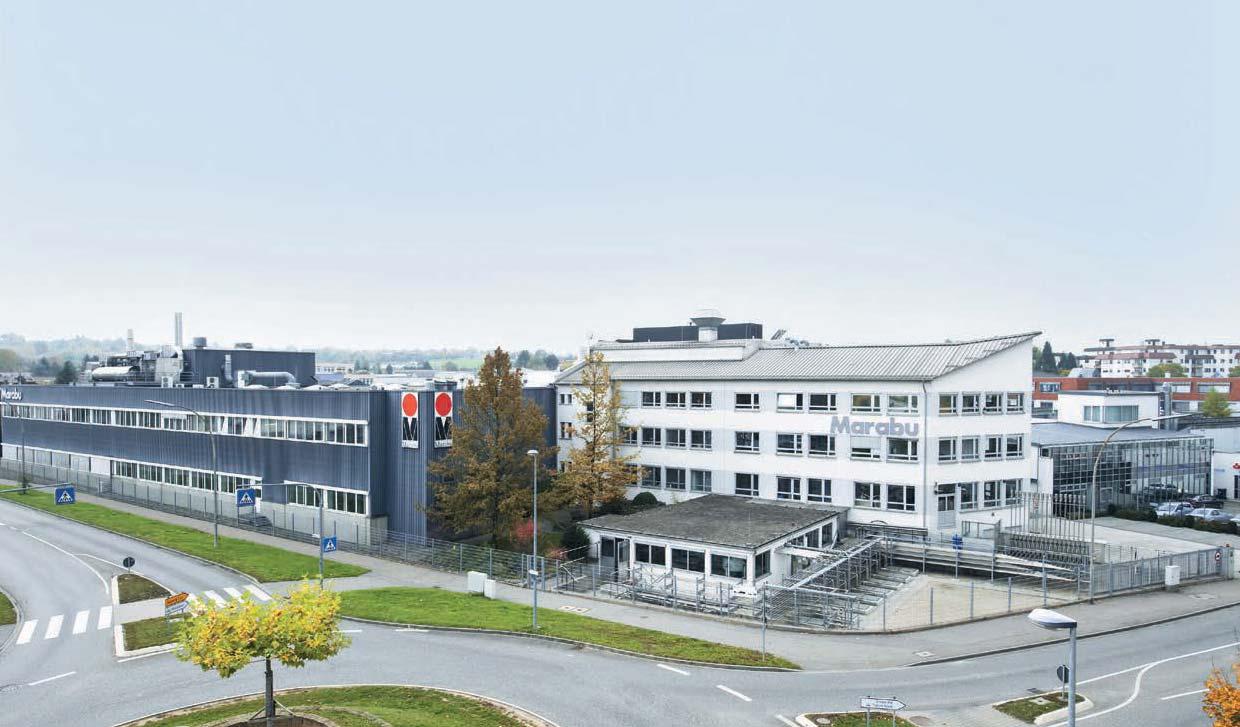
From 2012 onwards, quality management, environmental protection and workplace health and safety requirements have also been applied to core processes of our subsidiaries. Our exemplary approach is of textbook character, and was described in a chapter of “Business by Springer in 2021, a book that presents real-world case studies.
local language. These are online, and therefore accessible to all employees. This guarantees consistently high quality and pioneering environmental protection standards worldwide.
Where can the book be purchased?
Chapter on Marabu’s success story:
Standards: The Case of the Production Company Marabu.
Digital Transformation – Strategy, Processes and Execution (pp. 249-259). Springer, Berlin, Heidelberg.
Our Marabu Group global management system
The senior management at our headquarters in environmental policies, and the annual goals for of an annual management review. The quality, environment and safety team assists subsidiaries and is responsible for the central planning of the entire management system and the continuous
are employed to measure the system’s progress. The matrix has the advantage that individual three years, depending on the standard, and the The exceptions are the headquarters, where the China due to national regulations.
INKS ARE OUR PASSION – SUSTAINABILITY OUR GOAL











Environmental protection, occupational health and safety, resource conservation, the circular economy, supply chain tracking and tracing, logistics, knowledge transfer and awareness raising are all key ways of strengthening sustainability within an organisation. Marabu Group has long set very high standards in this environmental management system go beyond statutory requirements, and continue to be expanded and enhanced. The Environment, Quality and Safety department oversees all relevant activities at international sites, and offers advice and assistance. The team also supports all sites during their annual audits. The following chapters are dedicated to the individual Marabu company locations and not only describe what has been achieved, but also the current situation of each subsidiary within its sales territory.












worldwide since 1995



















25,234.8 tonnes German & Scandinavian locations have been reducing their emissions with green electricity since 2007




Around 212 tonnes of materials that can be reused are collected annually at all Marabu sites


















246 employees at the site in total

SCREEN PRINTING INKS | PAD PRINTING INKS | DIGITAL PRINTING INKS | LIQUID COATINGS
Research and Development
Production: Printing Inks
Logistics

Administration
Product Management
Marketing
Distribution/Sales
Customer service
ISO 9001

ISO 14001
ISO 45001
Marabu GmbH & Co. KG, printing ink production plant and company headquarters
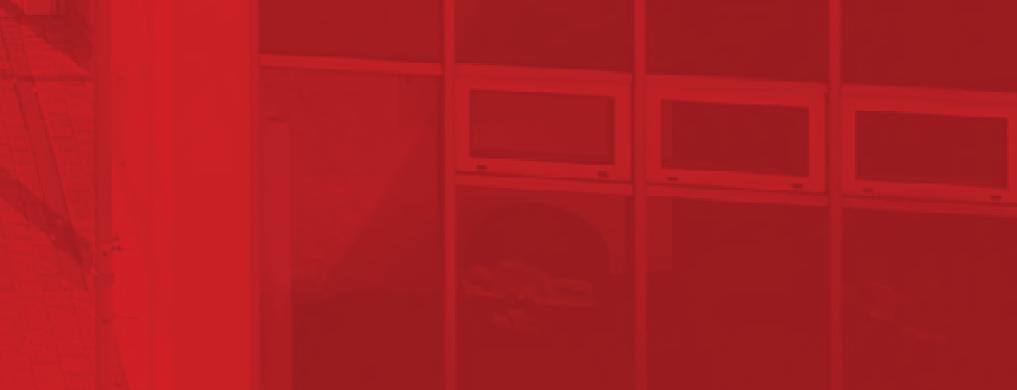

To make chemical products and protect the environment – surely that is a contradiction in terms? To an extent, it is. But we are working systematically to create “greener” products and manufacturing methods, to reduce waste, to conserve energy and natural resources, and to employ resources that are renewable.
At the same time, effectively protecting the environment is also about protecting human health generally, as high-quality air, earth and water, and less noise, are the basis for a healthy living environment.
Marabu, as a maker of inks, is a chemicals company that must comply with many statutory requirements overseen by regulatory authorities.
investment. But it ensures an intact environment and safeguards our own health.
for us all, one that requires all individuals and all institutions to pull together. And only those companies that are truly sustainable will survive.
to compare their corporate social responsibility performance, such as reducing greenhouse gas emissions.






voluntarily publish its greenhouse gas emissions, plus data on wood and water consumption, via CDP on a yearly basis. The Carbon Disclosure
the aim of determining companies’ climate risks, plus their mitigation goals and strategies, by means of standardised questionnaires. The CDP now manages the largest database of its kind, with reports received from 9600 enterprises,
Worldwide, 317 enterprises have succeeded in qualifying for category A, the best of all (there are a total of six, from A to F), including 19 from Germany.
Since 2020, Marabu Holding has been in the middle of the ranking (category D in a ranking of A-F). Thanks to our efforts in recent years to further reduce CO2 emissions and other environmentally relevant measures, we have made the leap to one of the upper C categories in 2024.
sustainability ratings, has awarded Marabu the silver medal for its commitment to sustainability
This marks us as one of the best 25% of companies
and Sustainable Procurement, plus the overall rating can, following approval, be viewed by our customers.

Over the last few decades, there has been human-generated greenhouse gases are driving global warming. Against this backdrop, we decided in 2007 to source our electricity exclusively from renewable sources, i.e. green electricity, generated by wind, solar and hydropower. Additionally, we continuously seek to per kg of manufactured ink through a variety ofing for decades, energy efficiency is very much a marathon, not a sprint – and a task we consciously address, as the results speak for themselves. Thanks to a bundle of technical and organisational measures, the specific energy requirement for electricity was reduced from
in 2023 and 2024 are due to the electricity used for the construction site for the refurbishment of our location.
To cool our production processes, four individual legacy cooling units were replaced by a single state-of-the-art 300 kW system with ambient air cooling, i.e. that is able to harness the low outdoor temperatures during the colder months of the year. And the system also boasts other energy-saving features,
in accordance with the outlet temperature of the cooling water, and with a condensation
savings achieved in comparison with a system without these features is approx. 150,000 kWh to 200,000 kWh annually.

Electricity consumption in MWh/year



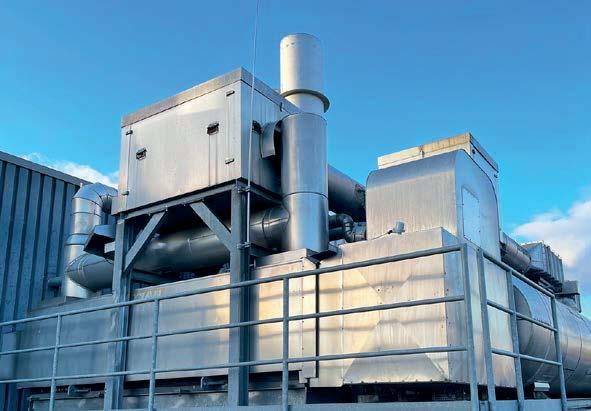
the last 50 years, and are connected to a of gas required has been fairly static for many years, and is a direct function of the number of cold days requiring active heating in any given calendar year.
to the district heating network is therefore planned for 2027. The network for this is currently being expanded by the city of Tamm and Marabu has is responsible for 16% of gas consumption, corresponding to approximately 400 MWh annually. At temperatures of some 600° C, it almost completely oxidises volatile solvents in the air extracted from production areas. The waste heat recovered from this process is employed for the in-house distillation plant and to dry production containers.
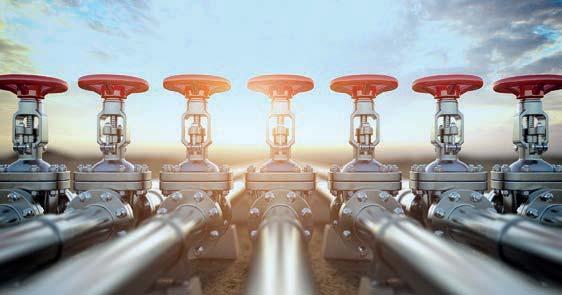
The careful analysis of our energy consumption, the implemented savings measures and our conviction to further minimise our climate footprint despite growing production have led to the decision to commit ourselves to reducing our emissions by a further 20% over the next 10 years as part of the Baden-Württemberg Climate Alliance.
2 emissions – according to international standards and using reliable
materials to the delivery of our products –demonstrated that emissions from upstream and downstream value chain activities (Scope 3) are 14 times higher than our Scope 1 value, yet are far more difficult to reduce as we have fewer means of influencing them.
Marabu’s Scope 1 value includes carbon dioxide produced by the combustion of gas, and fuel for company vehicles.
Greenhouse Gas Protocol emission categories (scopes)

By enhancing the heating system, and purchasing only electric or at least hybrid vehicles, we can considerably lower our Scope 1 value. There are already 18 charging stations available for this purpose at Marabu in Tamm.
Our use of CO2-free green electricity results in considerably lowered electricity consumption in lighting, introducing shorter stirring times in ink production, deactivating unnecessary equipment during periods when there is no production, and purchasing low-consumption equipment and devices. Moreover, we generate our own electricity via a photovoltaic array and produce hot water via solar panels.
To lower our large Scope 3 volume, we are using less packaging material and are investigating the increased use of recycled materials.

Where possible, we avoid shipping goods by air and keep business travel to a minimum. We are in favour of targeted working from home on the part of staff, as the pandemic has shown that the use of digital channels has a positive in 2020, emissions in the transport sector fell by 18% (cf. statistik-bw.de 2021), and we also expect the next assessment of our Scope 3 emissions to show a marked decline in the volume attributable to transport. The participation in campaigns supported by the company, such as ‘Stadtradeln’, in which the ‘Mara-Bikers’ took 2nd place in Tamm in July 2023 and saved 857 kg of CO2 by cycling almost 6000 kilometres, underpins our shared desire to make a contribution to an intact environment.
Scope 1, 2 and 3 in t/year not including materials and logistics


Scope 1, 2, 3 in t/year including materials and logistics


Scope 3 emissions, such as employee commutes, business travel, upstream gas and electricity, disposal of waste and other materials, canteen All scope 3 emissions, including procurement of raw materials and packaging materials, and outbound logistics

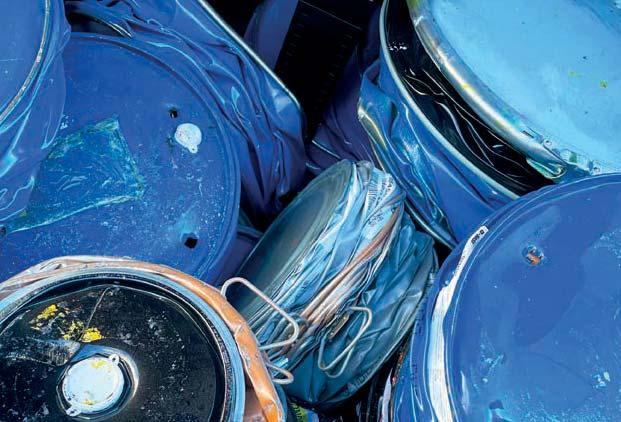
Marabu implemented effective waste management processes at a very early stage. From the outset, there has been a clear focus on avoidance, and on segregating waste for recycling – leaving
We are also continuously reducing our paint waste through process optimisation.
By modernising our production processes, we are already saving on the use of raw materials and ensuring that waste is only produced to the extent necessary. For the unavoidable waste from our paint sludge, we have installed
a distillation plant that filters the solvent content out of the paint sludge. We then reuse the recovered solvent to clean machines and containers and can therefore use it again and again in the cycle.
Detailed documentation on the origin of necessary transparency of the cause of the waste and provides the data material for improvements to prevent waste from occurring in the first place.


up as paper. And paper consumption continues to grow worldwide –from 130 million tonnes in both paper use and production, Germany is in illegal, leads to annual deforestation worldwide of around 30 million hectares of land, a loss
And this despite the vital importance of global forests as gigantic stores of carbon dioxide, influencing the climate and acting as a key habitat for flora and fauna. The paper industry has a key role in determining the future of our forests (cf. wwf.de 2022).
Paper consumption in sheets/year
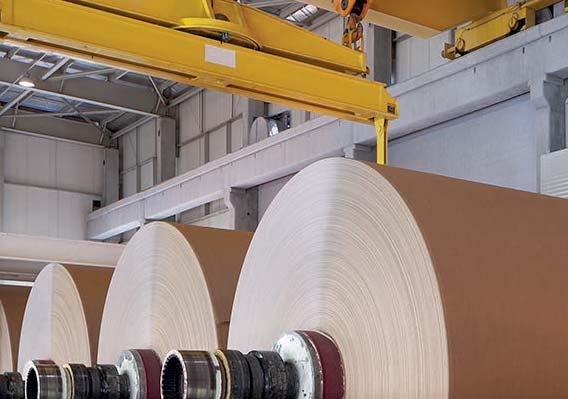

Marabu has been focussing on saving paper for many years. Thanks to the digital exchange of information and documents with customers and suppliers, paper consumption has been halved in the past 4 years from 900,000 sheets per year in 2021 to 400,000 sheets per year in 2024. We only use 100% recycled paper that has been awarded the ‘Blue Angel’ label.
The trend is clearly moving in the right direction: away from paper and towards digital communication channels to protect our forests.

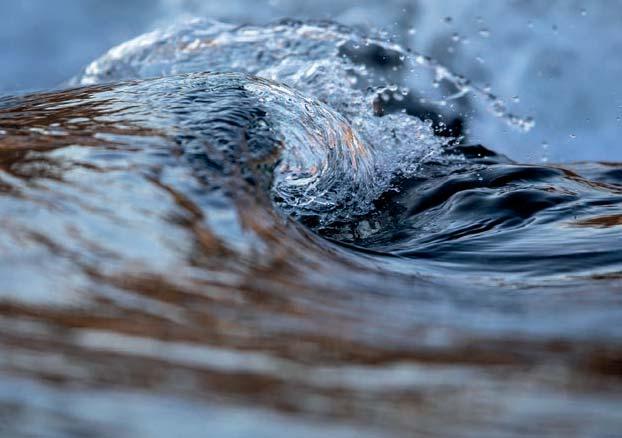
Water usage at Marabu in Tamm is of little to cool machinery in closed-loop systems. in increasing amounts as a raw material for water-based inks.
Accordingly, waste water is currently of a composition comparable to that from private households, and can be discharged into the public sewage system, which takes it to a nearby treatment plant. Drinking water consumption increased slightly in 2023 and 2024 due to higher proportions of water-based inks and a construction site for the refurbishment of our location.

Especially critical for us as a printing ink manufacturer is packaging for food and personal care products. To uphold the exceptional quality standards that apply to the ingredients and manufacturing processes, Marabu decided to make the corresponding inks in line with Good standard for the relevant sectors. Following the involved 100% testing of the raw materials to ensure consistent quality, packaging can now be
Water consumption in m3/year

A certified quality management system in our company headquarters in Tamm as early as to environmental protection and sustainability by introducing a certified environmental management
Since 2012, our company has also had an occupational health and safety management system, certified to the OHSAS 18001:2007 standard until 2021 and awarded the ‘Systematic Safety’ seal of approval.
safety management system was finally successas SimS plus.


Since 2013, we have expanded our management system worldwide by introducing a QHSE requirements guide and successively certifying our subsidiaries as part of the Marabu Group
extended requirements such as risk management, organisational knowledge and consideration of the product life cycle.
The Marabu headquarters in Tamm and our subsidiaries in seven countries (eleven locations
our global MMS will be successively expanded to include additional locations and standards











CREATIVE COLOURS
Research and development
Production: Printing Inks
Logistics
Administration
Product Management
Marketing
Distribution/Sales






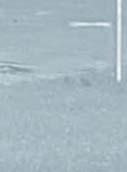

85 employees in total at the location
Customer service

ISO 9001
ISO 14001
FSC® 2013
Marabu GmbH & Co. KG, Creative Colours plant

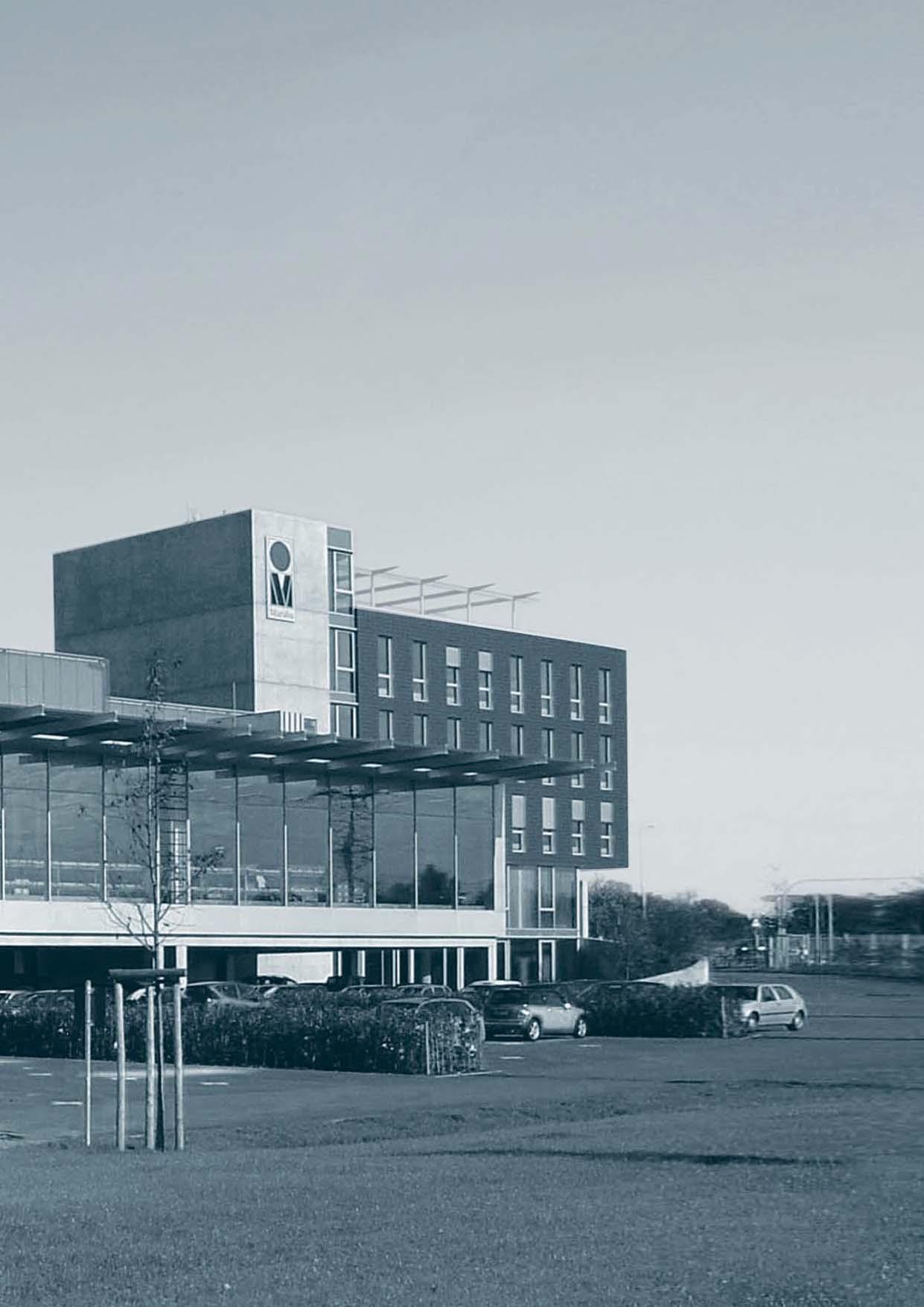
Our Creative Colours are almost entirely chemical substances and mixtures).
the Creative Colours business unit decided to develop an especially sustainable paint. Two years later, we can state: mission accomplished.
alkyd ink onto the market. Made with raw materials derived from vegetable oil, Marabu will commence manufacture of an entirely new type of product that is an attractive option for artists working on canvas and people pursuing a creative hobby on a variety of substrates.
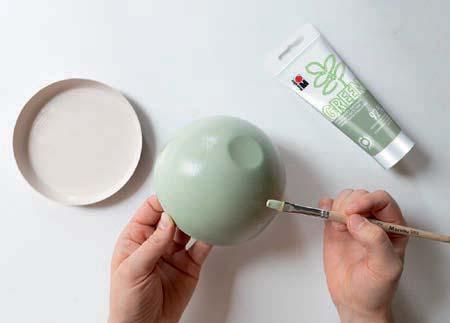


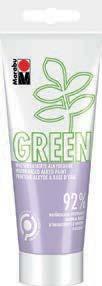



At least 92% of this vegan product comprises raw materials of natural origin (including water and renewable materials).
ingredients but also to the packaging. The tube requires up to 30% less input material than a conventional tube. Additionally, as the new tube material is thinner, it is easier to completely remove all its contents. The packaging is 100% recyclable if the cap is disposed of separately. The quality and ease of use correspond to the high made-in-Germany standards that Marabu is famous for.
But “ is about much more than the development of a single product.
regard to their environmental impact, and
product packaging and shipment packaging, Marabu not only pays attention to appropriate of recycled material used.
95%, followed by up to 80% for plastic blister packs, and up to 40% for glass. But there are still areas that can be improved. For instance, we now prioritise banding for palletised shipments rather than stretch wrap wherever possible.
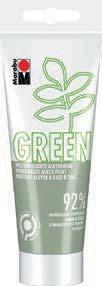



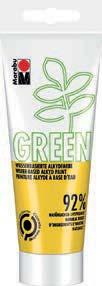




The Creative Colours unit is in a state-of-the-art industrial building, 2 km from Marabu headquarters, where all operational processes, from goods received, to manufacturing, to storage proximity to each other.
creating a pleasant working environment and enabling best possible use to be made of
Electricity consumption in MWh/year

all artificial lighting has been converted to system ensures all lights, except for emergency lighting, are turned off outside of working hours.
As a result, the specific electricity requirement
this value unfortunately rose again slightly due to insufficient production volumes compared to the basic electricity requirement.










The advanced natural-gas heating system is also connected to the building control system and supplies heat in line with actual requirements. Moreover, the waste heat from the air compressors is used to heat the production areas in winter.
The building is well sealed and insulated.
To minimise the environmental impact of the structure, plants are cultivated on large areas of the roof. This “green roof” retains moisture and, during warmer weather, helps cool ambient air through evaporation. As a result, only certain critical areas, such as the laboratories, require
Gas consumption in MWh/year
additional powered cooling at certain times of day in the summer. Air conditioning serves, on the one hand, to ensure compliance with governing workplace health and safety. On the other, it ensures consistent conditions for paint quality control checks – the ideal interior temperature for this process is a constant 23° C.
Due to the good energy efficiency of the building, the Scope 1 value at the Bietigheim-Bissingen site is only 272 tonnes per year, while the Scope 3 value is 16 times higher at over 4480
2 share, together with our suppliers and forwarders, will also be the
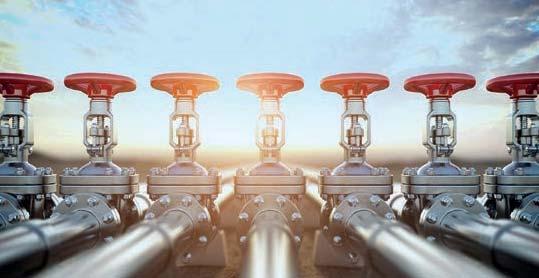
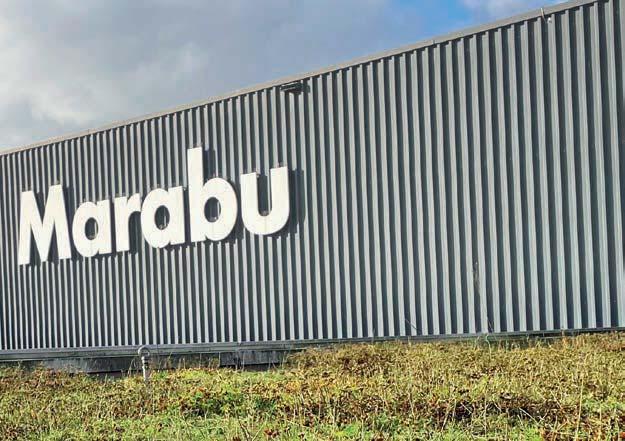

Scope 3 emissions are mainly caused by purchased goods and services. The raw materials used account for the largest share of this. By substituting raw materials, we reduce emissions without compromising the quality of our products. Saving on packaging is an ongoing process.
Scope 1, 2, 3 in t/year not including materials and logistics
from plastic packaging to cardboard packaging. This increases the proportion of recycled material and reduces plastic consumption. We are also continuously reducing Scope 3 emissions in logistics by procuring materials locally and minimising air transport. 272
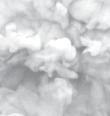
Scope 1, 2, 3 in t/year including materials and logistics

Scope 3 Scope 1
Scope 3 emissions, such as employee commutes, business travel, upstream gas and electricity, disposal of waste and other materials, canteen

All scope 3 emissions, including procurement of raw materials and packaging materials, and outbound logistics


Tamm, where binders are largely based on acrylate-oligomers, our Bietigheim facility makes paints with aqueous emulsions. Water is thereemployed to clean metal containers used in production. Waste water from this process is making it suitable for disposal via the public water by a recognised inspection laboratory has demonstrated that the quality of the water is far better than statutory thresholds. Our specific water consumption per kg of product is approximately 3.4 l.
A slight disappointment with regard to waste water treatment is the relatively large amount of
Following experiments with new chemicals, we have established that it will be possible to remove pollutants while producing some 80% less sewage
we commenced conversion to the new method in autumn 2021. This change will have a positive
At our Bietigheim plant, too, we regard the waste generated as raw material. Although we have not been able to end the correlation between the total annual volume of waste and production volume, the various waste types are collected separately and sent to recycling.
Water consumption in m3/year


system, air conditioning for laboratory, air extraction system in laboratory, green outside space with pond
per cent (BBI) 2023
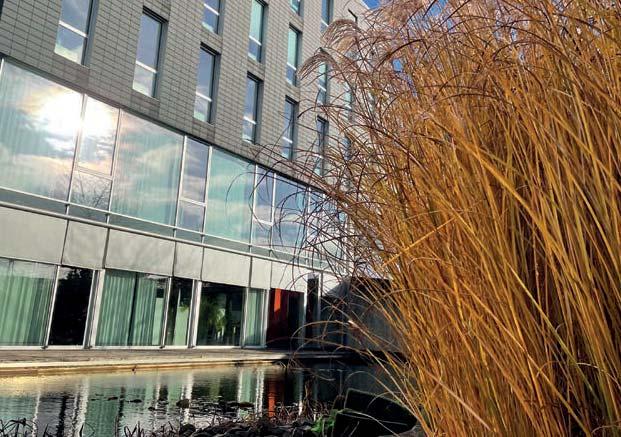





When purchasing wooden goods, Marabu only uses wood from well-managed forests. The “Forest Stewardship Council ® Janeiro in 1993 to promote ecologically appro-
Marabu has been listed in the global database of FSC® then, all items made of wood or with wooden components such as brushes, pencils, stretcher
frames and easels have been made from FSC®2020, Marabu expanded the FSC®
label will be added from 2022.
by purchasing painting accessories from Marabu, everyone can make a small contribution to protecting the forest through their shopping habits.
credits
Cover photo
P. 6, 21, 33
Chart gas consumption P. 22, 34
P. 27, 36
Paper usage chart P. 26, 37
Chart Waste Amount P. 25, 37
Diagram Scope P. 24, 35 P. 37
companies must measure their carbon footprint and create a report industries and companies to present their CO2 emissions along the supply chain in a comparable manner and ultimately also to show the improvements. The greenhouse gas (GHG) protocol was drafted back divides emissions into 3 scopes: Scope 1, 2 and 3.
Scope 1 includes all direct emissions arising from the activities of an organisation or its subsidiaries (emission sources: heat, cooling and steam generation, the company‘s vehicles and air conditioning leaks); Scope 2 includes the indirect emissions from electricity, heat and steam that companies buy from utilities; Scope 3 includes the other indirect emissions in the supply chain (activities along the value chain - both upstream at suppliers and
Global Commitment
Marabu – Germany P. 26
Marabu – Germany P. 27
Marabu GmbH & Co. KG
Asperger Straße 4 71732 Tamm Germany
Phone: +49 7141 691-0
Fax: +49 7141 691-147
E-mail: info@marabu.com www.marabu.com
Management: York Boeder, CEO
Marabu GmbH & Co. KG
Marabu GmbH & Co. KG Asperger Straße 4 71732 Tamm · Germany www.marabu.com